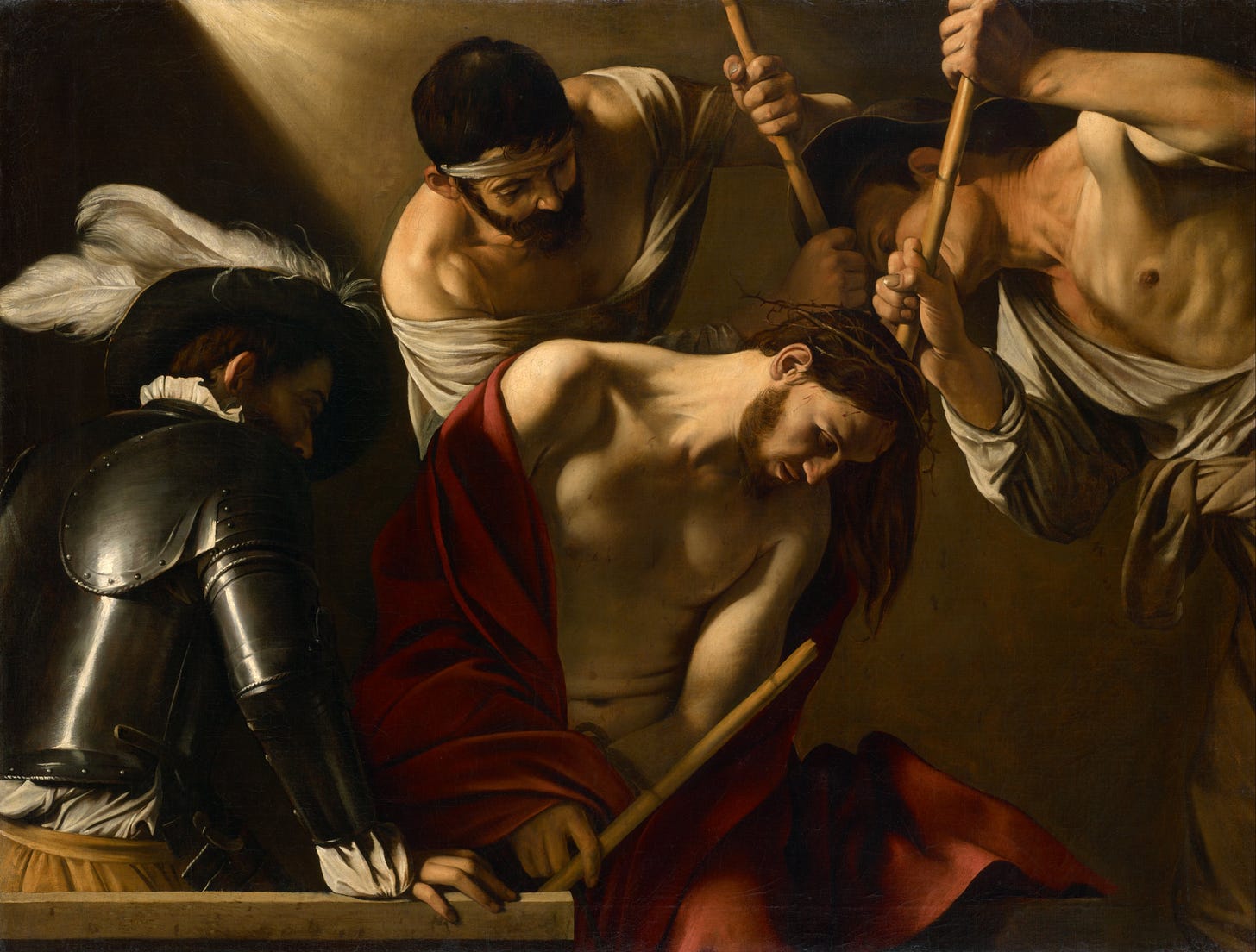The Comfortable Christ
An Easter Essay
“For ye are dead, and your life is hid with Christ in God.” Colossians 3:3
Terrence Malick’s beautiful A Hidden Life (2019) narrates the true story of Franz Jägerstätter, a humble Austrian farmer put to death by Nazi Germany for refusing to fight for Hitler and the Axis powers. The film brilliantly—and painfully—depicts the uncomfortable consequences of his moral stand (which come by his refusal to simply sign a document in support of Hitler): his wife is ridiculed by their friends and family, they are shunned from societal normalcy, he is taken from his wife and daughters to a secretive prison camp, and eventually executed. Despite the tragic and real repercussions of his decisions, he holds fast to his belief in Christ, his ultimate accountability to the same, and his faith in the words: “In the world ye shall have tribulation: but be of good cheer; I have overcome the world” (John 16:33).
The power of the film—a masterpiece of cinematic awe, capturing the verdant landscapes of rural Austria and the good life once lived therein—rests on a hinge point, a kind of painted vanishing point at the center of the story. While Franz contemplates the inevitable outcome of his looming decision, he speaks with the parish church painter in the act of decorating their local space of worship. Within their dialogue, the painter makes a curious statement regarding his representations of Christ: “I paint their comfortable Christ, with a halo over his head. How can I show what I haven’t lived? Someday I might have the courage to venture, not yet. Someday, I’ll paint the true Christ.” That one adjectival descriptor for the Son of God, the “comfortable” Christ, sat unwell with me in my own guilt for a few months after watching—it still hits too close to home. The phrase, “the comfortable Christ” continues to mull around in my heart and mind as I wonder to which Christ I give my devotion? The painted, comfortable, easy-goin’ Christ who loves me no matter what? Or the true Christ, the covenant Christ who came with a sword, who cleansed the temple with indignation, who bore my burdens and expects me, in the strength He gives, to help others bear theirs as well?
What did the painter mean by the comfortable Christ, and why couldn’t he paint Him, the true Christ? At that point in the film, I believe Franz would not have had it in him to paint the true Christ either, for his hidden life was one of blissful peace and comfort—a life worshiping Christ, but not yet yoked to him. Many today who profess faith or belief in Christ (including myself) worship this comfortable Christ: one who smiles while you do you, and really doesn’t care if you love your neighbor (both digital and physical) as yourself. The comfortable Christ says it’s okay to lie a little, steal a little, cheat a little, take advantage of others for money (you need it), disparage people online for your own beliefs, and “live your life,” so long as you’re comfortable—or worse, socially or digitally triumphant. The true Christ, however—the covenant Christ who cannot be painted, only known—taught that we must lose ourselves to find ourselves, that “If any man come to me, and hate not his father, and mother, and wife, and children, and brethren, and sisters, yea, and his own life also, he cannot be my disciple… [for] whosoever he be of you that forsaketh not all that he hath, he cannot be my disciple” (Luke 14: 26, 33). Those who worship the true Christ must lose themselves—everything, read the previous scripture again—to find themselves. The disciples of the true Christ worship Him, and Him alone, and He gives them their reward. They are no respecters of persons; they are unmotivated by the world and its monetary rewards and find true ease in the strength only Christ could ever give.
I have been blessed to know many such men and women who worship the covenant Christ: men and women who know the names of their neighbors; women who enter homes both filthy and putrid to lift the hands that hang low; men who take time away from their families to help boys with no fathers, girls with no righteous men to look to, and women with no husbands; women who call people by name, embrace them, and love them as themselves, who lack the words to the questions of career and “why a family”; men who stand in the quiet strength of God, never for social acceptance/awareness, but to speak the truth in a world full of lies.
I saw this recently in a simple gesture by my wife, someone who continually teaches me to love and worship the true Christ. We were waiting in line at check-in for Ryanair (yes, an already bad beginning to the story). For a while, we stood some people behind a woman with nothing but two checked bags. As I saw her head to the attendant, I felt a prompting to watch and observe, which I comfortably ignored. But the story unfolded as we waited. Judging from her appearance and desperation, she looked a foreigner in a strange land, longing to return home with everything she had ever had in those two humble bags. Reading the body language from both her and the employee, I intuited that she didn’t purchase her checked bags (classic Ryanair), and wouldn’t be let on the plane without paying. She stayed at that desk for half an hour until we made it to our own attendant for check-in. And I continued to ignore the promptings, leaning into the comforts of ignorant bliss and my own preoccupations with my family. I began to hear tears, and “miss the gate is closing in 5 minutes, you won’t make the flight,” and I turned away. But my wife didn’t. She stepped over humbly, uncomfortably, in front of hundreds of angry/stressed people and handed the worker a card without asking any questions. “Do you know each other?” the woman behind the computer asked. She did not, and she told her to pay the bags. The foreign woman wept and embraced my wife, and in my heart I knew that was what God wanted us to do—what my wife obediently did and I ignored to my own ease, the comfortable Christ smiling down upon me.
My wife didn’t ever talk about it after except to say “I hope she makes her flight.” She didn’t pay for her bags to feel good about herself or to look good, nor to preach to the woman, nor to tell her “you know you could have avoided all this if you just read your emails.” No, that would be the path of the comfortable Christ: the Christ who lets you feel vindicated for your own wisdom, humility, and brilliance. My wife helped this woman because she loves the true Christ, the resurrected Christ who lives and to whom we will all stand accountable at the last day. Because my wife stands yoked to him (not always, she isn’t perfect, that’s what allows us to have a good mortal marriage in preparation for eternity), there is no need for reward—the reward is a yoke made easy, and a burden made light. Praise, recognition, likes, followers, these are the things of the world, the things of the comfortable Christ. The reward from the covenant Christ comes only as we yoke ourselves to Him and never look back lest our salt lose its savor. The reward is unspeakable, intangible, and deeply changes our motivations. The moment of yoking is the difficult part—rather uncomfortable as you strip yourself from the world and its distractions (a daily endeavor of repentance, perhaps)—but from there the burden is easy, that is, if you trust the words of the true Christ. But once fully-yoked, disciples of the true Christ feel no pain from the despise of the world, as did Franz who, in his prison cell, in final moments of torture and beating, smiles at the prison guards, stating “I am free.”
This Easter Sunday, in which we would do well to celebrate the true Christ, the covenant Christ, the resurrected Christ, look to lie down in the dirt with your fabricated comfortable Christ, and rise with the risen Lord of Hosts anew, yoked to Him in His way, and to your initial discomfort. Help those you know you are supposed to help; heal the broken bonds within your family; speak the truth in humility and not for recognition; and above all, worship that Christ who will set you free from the needs of mortal comfort and show you the path to that “well of water springing up into everlasting life” (John 4:14).
If you liked this, subscribe for more:






Beautiful